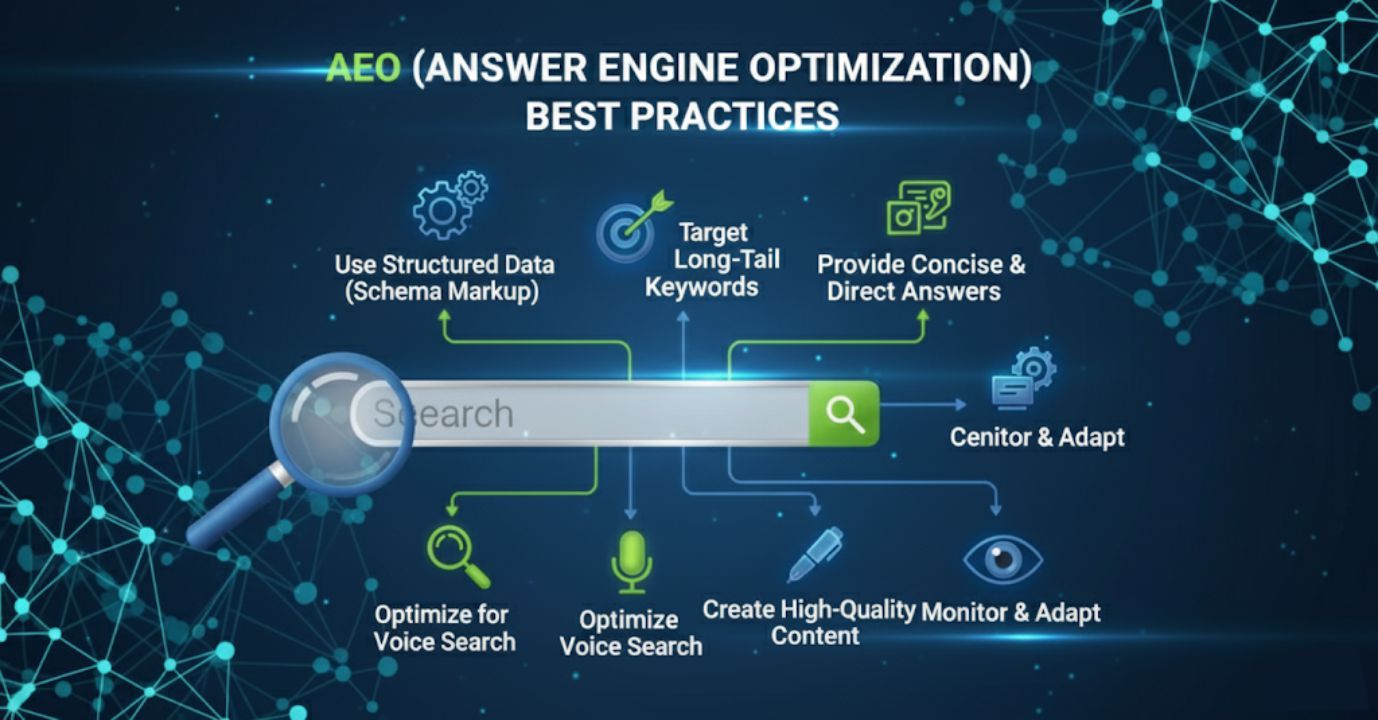Answer Engine Optimization in 2026: Best Strategies to Rank as the AI-Preferred Answer
Introduction: The Rise of AI-Powered Search
Search engines are evolving at lightning speed. A few years ago, the goal of digital marketers and website owners was simple—rank high on Google’s first page. But in 2026, the rules have changed. Users don’t want to scroll through endless blue links; they want instant, accurate answers delivered directly by AI tools, voice assistants, and answer engines.
Enter Answer Engine Optimization (AEO)—the next frontier of search visibility. Unlike traditional SEO, which focuses on driving clicks from organic rankings, AEO is about positioning your content to become the actual answer chosen by AI platforms such as:
- Google’s Search Generative Experience (SGE)
- Microsoft Bing Copilot
- ChatGPT-powered search assistants
- Voice assistants like Alexa, Siri, and Google Assistant
By embracing AEO, your content doesn’t just rank—it becomes the trusted solution users receive directly from AI-driven systems.
Why AEO is Essential in 2026
The digital search ecosystem has shifted due to three key forces:
- Voice Search Growth – Nearly 50% of online searches are now voice-based, where users expect short, conversational answers.
- AI Chatbots Replacing Search – Platforms like ChatGPT and Perplexity.ai provide responses without users ever visiting a website.
- Zero-Click Searches – More people get the answer directly from search results, meaning only machine-friendly content wins visibility.
In this new era, if your content isn’t structured for AI comprehension, it risks becoming invisible. AEO bridges this gap by making your site human-friendly and machine-ready.
AEO vs SEO: What’s the Difference?
| Element | SEO (Search Engine Optimization) | AEO (Answer Engine Optimization) |
|---|---|---|
| Primary Goal | Rank high on SERPs | Be chosen as the AI’s direct answer |
| Content Style | Keyword-driven | Conversational, intent-focused |
| User Journey | Click-through to a website | Zero-click answers, citations |
| Key Signals | Backlinks, metadata, keyword usage | Clarity, EEAT, structured Q&A |
👉 The two aren’t competitors—they complement each other. SEO gets visibility, but AEO wins authority, trust, and brand exposure in an AI-first environment.
Core Principles of AEO
1. Intent-Based, Conversational Content
Today’s users don’t type “best green tea benefits”—they ask:
- “What are the benefits of drinking green tea?”
- “When should I drink green tea for weight loss?”
Optimization tips:
- Target question-based keywords.
- Provide 40–60 word summaries before diving deeper.
- Use a conversational, natural tone.
2. Structured Formatting for AI Readability
AI engines need structure. Proper formatting improves your chances of being extracted as an answer.
Best practices:
- Use H2s for subtopics and H3s for supporting points.
- Add bullet points, numbered lists, and tables.
- Break down processes into step-by-step formats.
3. EEAT: Experience, Expertise, Authoritativeness, Trustworthiness
AI engines cite only content they can trust. Google emphasizes EEAT signals when selecting top answers.
How to improve EEAT:
- Publish under expert authors with bios.
- Include first-hand case studies, statistics, or real experiences.
- Keep content updated and fact-checked.
4. Technical SEO Performance
AEO won’t work if your website is slow or inaccessible.
Key technical priorities:
- Mobile responsiveness
- Core Web Vitals (LCP, CLS, INP)
- HTTPS security
- Schema markup implementation
Best Practice Strategies for AEO in 2026
1. Research User Intent Beyond Keywords
AI doesn’t care about keyword stuffing—it cares about intent.
Sources for user questions:
- Google’s People Also Ask
- Forums like Reddit, Quora
- Social platforms like X (Twitter) and LinkedIn
- AI-powered keyword tools
2. Use Q&A Format Effectively
AI engines are trained on Q&A data structures.
Strategy:
- Start with a direct answer under 60 words.
- Follow up with detailed explanations.
- Use subheadings in the form of questions.
3. Add Structured Data (Schema Markup)
Schema helps search engines understand context.
Recommended types for AEO:
- FAQPage
- HowTo
- Article
- Product & Review (for eCommerce)
4. Strengthen On-Page SEO
Even with AEO, traditional SEO elements still matter.
Checklist:
- SEO-friendly title with target keywords
- Compelling meta descriptions (≤160 chars)
- Clean, short URLs
- Alt tags for images
5. Build High-Authority Backlinks
Backlinks remain signals of trustworthiness.
Ways to earn links:
- Publish original research, surveys, or reports.
- Collaborate with industry publications.
- Guest blog on niche authority sites.
6. Monitor, Measure, and Adapt
AEO is not “set and forget.” Continuous iteration is vital.
Track:
- Featured snippet rankings
- Voice search performance
- Citations in AI platforms
Tools to use: Google Search Console, Ahrefs, Semrush, Perplexity tracking
Common AEO Mistakes to Avoid
❌ Over-optimizing with keyword stuffing
❌ Ignoring mobile usability
❌ Publishing duplicate or shallow content
❌ Skipping schema markup
❌ Writing for bots instead of humans
Read more Common AEO Mistakes to Avoid
Real-World AEO Success Stories
Mayo Clinic
Their structured medical content, authored by experts and backed by schema markup, makes them the go-to health source in Google SGE and Alexa responses.
Bank of America
Through FAQ-rich financial guides, they dominate AI-driven banking queries such as “How to open a checking account?”
Amazon
With detailed product descriptions, reviews, and Q&A sections, Amazon’s pages feed AI models the richest dataset, ensuring dominance in product-related searches.
The Future of AEO (2026 and Beyond)
Upcoming trends:
- Voice-first search dominance
- Multimodal answers (text, video, images, audio)
- AI predictive search (answers before users ask)
- Transparent AI citations (brands credited by default)
👉 Future-proofing your content means staying agile, updating frequently, and embracing new content formats.
Conclusion
Answer Engine Optimization isn’t optional—it’s survival. In 2026, being the “AI-approved answer” translates to brand authority, higher trust, and more visibility than even traditional SEO can provide.
To win in this space:
- Focus on user intent over keywords.
- Structure content for clarity and AI extraction.
- Apply EEAT principles to build credibility.
- Leverage schema markup and backlinks for authority.
In a world where search is increasingly AI-powered, AEO ensures your brand’s voice is not just heard—but chosen.
Read Also:

